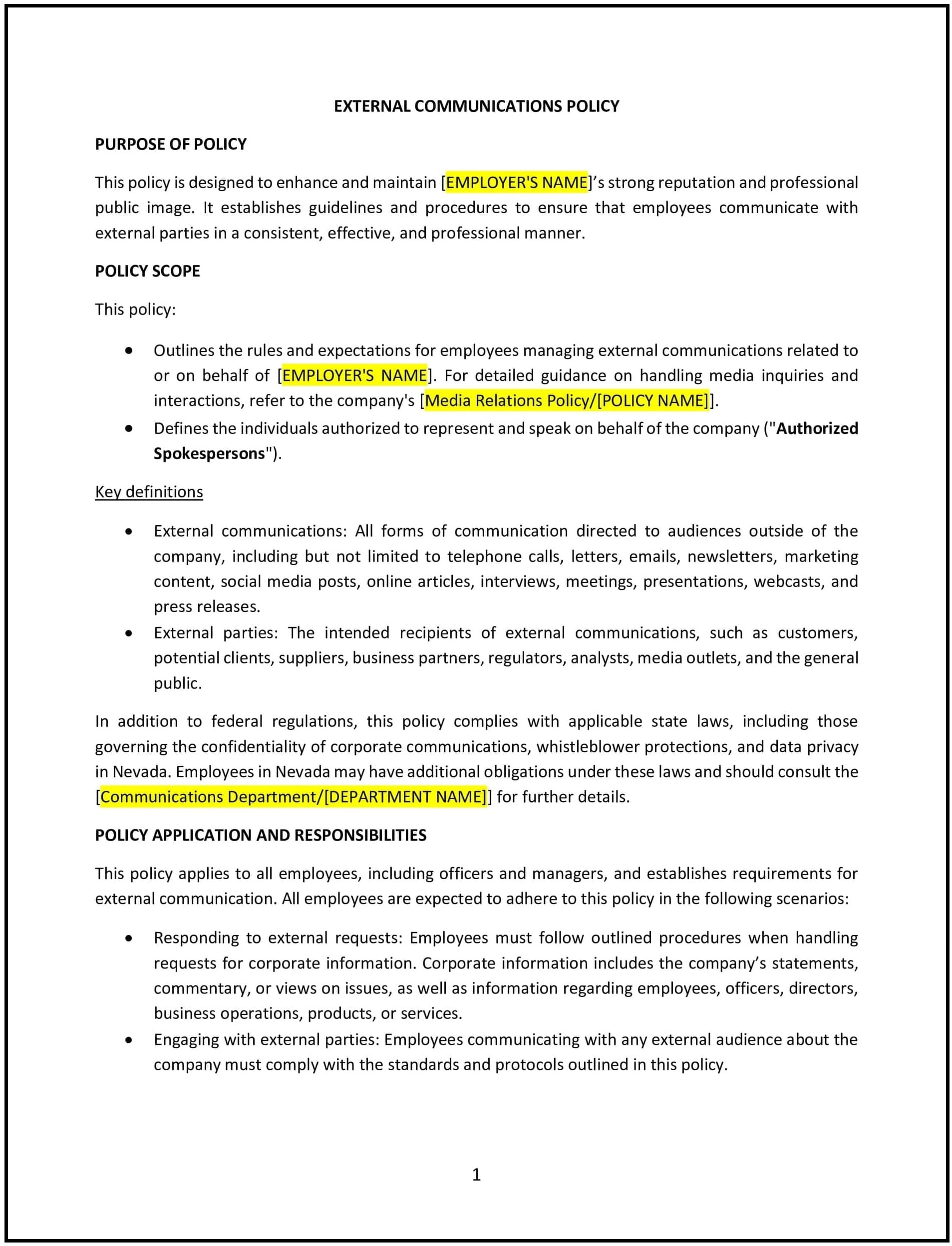External communications policy (Nevada): Free template
Got contracts to review? While you're here for policies, let Cobrief make contract review effortless—start your free review now.

Customize this template for free
External communications policy (Nevada)
This external communications policy is designed to help Nevada businesses manage all communications with external parties, including media, customers, investors, and the public. The policy outlines how employees should handle external communications to ensure consistency, accuracy, and compliance with the company’s values, legal requirements, and branding guidelines.
By adopting this policy, businesses can protect their reputation, ensure clear and effective communication, and maintain control over the messaging shared with external audiences.
How to use this external communications policy (Nevada)
- Define external communications: Clearly define what constitutes external communications, including interactions with media, press releases, social media posts, email campaigns, and any public-facing documents or statements.
- Designate authorized spokespeople: Identify who within the organization is authorized to speak on behalf of the company in external communications, such as the CEO, PR manager, or designated spokesperson. Emphasize that only these individuals should respond to media inquiries or represent the company publicly.
- Set guidelines for media interactions: Outline how employees should interact with the media, including providing information to journalists, responding to interview requests, and issuing press releases. Employees should be trained to direct media inquiries to the authorized spokesperson.
- Clarify social media guidelines: Establish guidelines for employees regarding their personal use of social media, particularly in relation to discussing the company. Employees should avoid sharing confidential information, making disparaging comments, or misrepresenting the company on social platforms.
- Maintain consistent messaging: Ensure that all external communications reflect the company’s core values, mission, and vision. The policy should encourage consistency in messaging across all platforms and media outlets, whether through advertising, interviews, or customer service interactions.
- Address legal compliance: Ensure that external communications comply with applicable laws and regulations, including advertising standards, privacy laws, intellectual property rights, and securities regulations for public companies.
- Protect confidential information: Clearly state that employees should not disclose confidential or proprietary company information to external parties, including trade secrets, financial data, and upcoming product plans, unless authorized.
- Provide crisis communication protocols: Include procedures for handling external communications during a crisis or emergency situation, such as product recalls, legal disputes, or public relations issues. The policy should specify who is responsible for managing crisis communication and the steps to follow in these situations.
Benefits of using this external communications policy (Nevada)
This policy provides several key benefits for Nevada businesses:
- Protects company reputation: By ensuring that external communications are accurate, consistent, and aligned with company values, businesses can safeguard their reputation and maintain trust with customers, investors, and the public.
- Promotes consistency: The policy ensures that all communications, regardless of the channel, reflect the company’s key messages and avoid conflicting statements.
- Reduces legal risks: By complying with relevant laws and regulations in all external communications, businesses can minimize the risk of legal disputes or penalties.
- Streamlines media interactions: Designating authorized spokespeople and establishing clear procedures for media interactions helps streamline communication processes and ensures the company speaks with one voice.
- Prepares for crisis management: The policy helps businesses respond quickly and effectively during crises by providing a clear framework for managing public-facing communication.
Tips for using this external communications policy (Nevada)
- Communicate the policy clearly: Ensure that all employees are aware of the external communications policy and understand the importance of following it. Include the policy in employee handbooks and provide training on handling external communications.
- Regularly review the policy: Periodically review the policy to ensure it remains aligned with changes in business operations, legal requirements, and industry best practices. Update the policy as necessary to reflect these changes.
- Monitor external communications: Regularly monitor external communications to ensure compliance with the policy. This includes reviewing social media posts, press releases, and customer-facing materials for consistency and accuracy.
- Provide media training: Offer media training for designated spokespeople, including guidance on how to handle interviews, respond to sensitive questions, and communicate key messages effectively.
- Crisis communication planning: Develop and practice crisis communication procedures as part of your overall emergency preparedness plan. Ensure that employees are aware of the steps to take in case of a public relations emergency.